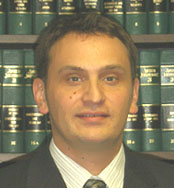

| THE SAINT PAUL PERSONAL INJURY ATTORNEY |
 |
 |
|
TAX - no record showing proper statutory appeal; late appeal dismissedSTATE OF MINNESOTAIN SUPREME COURT A05-2387 Tax Court Gildea, J. Piney Ridge Lodge, Inc., Relator, vs. Filed: July 27, 2006 Office of Appellate Courts Commissioner of Revenue, Respondent. S Y L L A B U S Where the record does not disclose that taxpayer complied with the statutory appeal provisions, the tax court correctly dismissed the appeal served and filed after the statutory deadline. Affirmed. Considered and decided by the court en banc without oral argument. O P I N I O N GILDEA, Justice. Piney Ridge Lodge challenges, by writ of certiorari, the tax court’s dismissal of its appeal. Piney Ridge argues that its February 2005 appeal was timely because it had conversations with an audit supervisor in the Department of Revenue that preserved its right to formally appeal to the tax court. Because there is no evidence in the record indicating that Piney Ridge complied with the statutory procedures for formal or informal appeal, we hold that the tax court properly dismissed an appeal filed well after the 60-day appeal period. Piney Ridge Lodge, a resort near Pine River, Minnesota, did not file corporate franchise tax returns for 1998, 1999, 2000, and 2001. Pursuant to statutory authority, the Commissioner of the Department of Revenue issued a Notice of Change in Tax to Piney Ridge on September 2, 2003 (Notice), assessing the past-due taxes. With penalties and accrued interest, the commissioner’s assessment totaled 1,057. The Notice stated that it was “an official order of the Commissioner of Revenue determining [Piney Ridge’s] corporate franchise tax liability for the tax periods” 1998, 1999, 2000, and 2001. The Notice included information about how Piney Ridge could appeal the commissioner’s decision. The Notice provided: “If you disagree with this notice, you have 60 days from the notice date to appeal informally to the Department of Revenue or formally to the Minnesota Tax Court.” Regarding the option of an administrative appeal to the department, the Notice stated: If you decide to appeal informally to the Department of Revenue, you must prepare a written appeal. Please include a copy of this notice. The appeal should include: your name, address and taxpayer ID number, taxable periods and the amount in question for each period; the items on the notice that you disagree with; a summary of the facts or law you are basing your appeal on; the date of your appeal and the signature of the person who prepared the appeal. Include any information or documentation to support your appeal, and mail it to the office and address listed below. * * * * If you appeal to the Department and your appeal is denied in whole or in part, you will have an additional 60 days to appeal that denial to the tax court. Sometime after its receipt of the Notice (the record does not disclose precisely when), Piney Ridge entered into conversations with an audit supervisor in the department. On or about December 9, 2004, the department sent Piney Ridge a document titled “Final Notice and Demand for Payment.” This document explained that the department was prepared to file a tax lien against Piney Ridge and to begin a collection action. It also encouraged Piney Ridge to explore an agreement regarding “payment terms” with the department. On February 11, 2005, Piney Ridge filed a notice of appeal in the tax court. The commissioner moved to dismiss, arguing that because the appeal was filed after the end of the 60-day period for appeal, the tax court lacked jurisdiction to hear Piney Ridge’s appeal. The tax court agreed and dismissed the appeal. The parties do not dispute the facts that are the basis for the tax court’s order dismissing Piney Ridge’s appeal. Accordingly, our sole task is to determine whether the tax court correctly applied Minnesota law, and our review is de novo. See Minn. Stat. § 271.10, subd. 1 (2004); Gonzales v. Comm’r of Revenue, 706 N.W.2d 909, 910-11 (Minn. 2005); Benigni v. County of St. Louis, 585 N.W.2d 51, 54 (Minn. 1998). The tax system is entirely a statutory creation. State v. Bies, 258 Minn. 139, 149, 103 N.W.2d 228, 236 (1960). We have said that “[t]he legislature has * * * the power to fix the conditions under which [a] tax should be assessed and enforced, and therefore compliance with those conditions is essential if the remedy is not to be lost and the rights are not to cease to exist.” Id. We seek to avoid a forfeiture of the right to appeal when construing a statute, but we have held that statutory time limitations on administrative appeals similar to this one are “strictly construed,” and we have recognized that such time limits are “jurisdictional.” Kearns v. Julette Originals Dress Co., 267 Minn. 278, 282, 126 N.W.2d 266, 269 (1964). We have upheld a tax court dismissal of a challenge to an assessment brought outside statutory time limits. See Benigni, 585 N.W.2d at 54 (“[T]he tax court correctly dismissed Benigni’s claim contesting his 1995 assessments for lack of timeliness.”). Minnesota law gives taxpayers two avenues for appealing the commissioner’s assessments. Taxpayers may file an appeal with the tax court “within 60 days after notice of the making and filing of an order of the commissioner of revenue.” Minn. Stat. § 271.06, subd. 2. Taxpayers also have the option of filing an administrative appeal with the department within 60 days. Minn. Stat. § 270C.35, subd. 4 (Supp. 2005). An administrative appeal results in a new order from the commissioner “determin[ing] the validity, if any, in whole or part of the appeal.” Minn. Stat. § 270C.35, subds. 6, 8 (2004) (Supp. 2005). Taxpayers have 60 days after the department issues an order resolving the administrative appeal to file an appeal with the tax court. Minn. Stat. § 270C.35, subd. 8 (noting that order issued in administrative appeal “is appealable to the Minnesota Tax Court under section 271.06”). Piney Ridge filed its appeal with the tax court in February 2005 and it purported to appeal from the document it received from the department in December 2004. Appeals to the tax court, however, may be taken only “from any official order of the commissioner of revenue.” Minn. Stat. § 271.06, subd. 1 (Supp. 2005). The December 2004 document was not an order from the department that is subject to appeal. By its terms, it is merely a document informing Piney Ridge that the department is about to commence a collection action to recover the assessment the commissioner previously determined to be due. The Notice, by contrast, tracks the language of the statute and specifically provides that it is an “official order of the Commissioner of Revenue.” Moreover, the subject of the appeal, as set forth in Piney Ridge’s “[e]xplanation of stated reasons for appeal,” was the commissioner’s assessment of delinquent corporate taxes for the years 1998, 1999, 2000 and 2001. This assessment is reflected in the Notice, which is dated September 2, 2003. Accordingly, under Minnesota law, Piney Ridge had 60 days after the Notice to either appeal the assessment to the tax court or file an administrative appeal with the department. Piney Ridge makes no claim that it filed its appeal with the tax court within 60 days of its receipt of the Notice. Rather, Piney Ridge seems to argue that its discussions with an audit supervisor in the department and its submission of additional information to the department should be deemed to have tolled the time period for perfecting an appeal to the tax court. But the tax law does not provide that discussions or negotiations with the department suspend the appeal period. We note that the legislature has specifically provided for tolling during dispute resolution processes in other statutes. See, e.g., Minn. Stat. § 363A.28, subd. 3 (2004) (“The running of the one-year limitation period is suspended during the time a potential charging party and respondent are voluntarily engaged in a dispute resolution process * * *.”). There is no such tolling provision for tax disputes. Piney Ridge’s conversations with the audit supervisor could be relevant to the question at hand if those conversations could be construed as an administrative appeal. But there is no merit to such an argument because both the statute and the notice clearly and unambiguously explain that an administrative appeal must be taken in writing. See Minn. Stat. § 270C.35, subd. 4. The record contains no such written appeal to the department. Piney Ridge cites authority that ambiguous tax statutes should be construed in favor of the taxpayer. See Benda v. Girard, 592 N.W.2d 452, 455 (Minn. 1999). But we find no ambiguity in the statutes at issue here. The administrative appeal statute states, “A taxpayer who wishes to seek administrative review must follow the procedures in subdivision 4,” and “the taxpayer must file a written appeal.” Minn. Stat. § 270C.35, subds. 2, 4. In the face of this clear language, we cannot construe oral conversations with an employee in the department to operate as an administrative appeal. The rights granted and limitations governing administrative appeals are creatures of the legislature. While we are disinclined to divorce a taxpayer from its opportunity to appeal an assessment, there is simply nothing in the record that can be reasonably construed as an effort on Piney Ridge’s part to initiate an administrative appeal in accord with the requirements of the statute. There likewise is nothing in the record to suggest that the department engaged in deception or took some action that was designed to preclude Piney Ridge from pursuing an appeal. Accordingly, we hold that Piney Ridge did not perfect an administrative appeal. We hold that the tax court did not err in dismissing Piney Ridge’s February 2005 appeal as untimely. Affirmed. |
|||||||||||||||||||||||||||||||||||||||||||||||||||||||||||||||||||||||
| By visiting this page or clicking the "submit" button above, you agree that you have read and accept this "disclaimer". |
||||||||||||||||||||||||||||||||||||||||||||||||||||||||||||||||||||||||
| Copyright ©
Michael E. Douglas, Attorney at Law, Saint Paul MN. All Rights
Reserved. Minnesota Lawyer representing Personal Injury, Car / Auto Accident, Workers Compensation, Medical Malpractice, Social Security Disability claims. Dedicated to Injured Workers, Victims of Negligence, Car Accidents, Victims of Fraud, and those in need of legal assistance. |